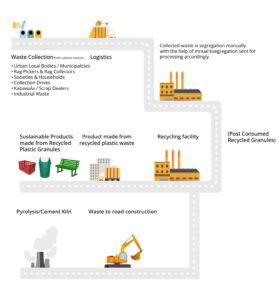
Extended Producer Responsibility (EPR) registration in India has become a mandatory requirement for businesses involved in manufacturing, importing, or selling plastic packaging. With the increasing concerns about plastic waste and environmental sustainability, the Central Pollution Control Board (CPCB) ensures that companies comply with plastic waste management rules. For manufacturers and brands, understanding EPR registration is essential to operate legally, maintain credibility, and contribute to India’s waste management goals.
What Is EPR Registration in India?
In India, EPR registration is the formal license that mandates manufacturers, importers, and brand owners to be accountable for the post-use environmental impact of their products. Businesses are required by the Plastic Garbage Management Rules to make sure that post-consumer garbage is properly collected, recycled, and disposed of. In addition to meeting legal requirements, this CPCB compliance certificate assists companies in adopting sustainable practices and avoiding fines.
Why Is EPR Registration Important for Manufacturers and Brands?
An important part of India’s plastic consumption cycle is played by manufacturers and brands. Businesses are not allowed to manufacture or sell packaged goods in India without an EPR registration. Beyond compliance, it protects brands from regulatory risks, demonstrates environmental commitment, and builds consumer trust. Additionally, as sustainability becomes a top concern for both government regulations and customer preferences, businesses that are registered with the EPR enjoy a competitive edge.
Who Needs EPR Registration in India?
Many types of businesses that deal with plastic packaging must register for EPR. Plastic packaging makers, importers, and brand owners (PIBOs) are all required to abide by the rules. EPR clearance is necessary whether you import products in plastic packaging, manufacture goods in India, or sell under your brand. Even online retailers who deal with packaged goods must make sure that these CPCB rules are followed.
Key Benefits of EPR Registration
In India, EPR registration benefits brands and manufacturers in a number of ways. First of all, it guarantees adherence to the CPCB’s regulations regarding plastic waste management. Second, by showcasing corporate accountability, it improves brand image. Thirdly, using organised waste management techniques offers long-term sustainability advantages. Lastly, businesses that have a valid EPR authorisation are protected from severe fines and company interruptions, which makes it an essential step for efficient operations.
EPR Registration Process in India
In India, gaining EPR registration entails a series of actions overseen by the CPCB. Companies must submit information on the plastic packaging they use, create an online application on the official portal, and supply the necessary paperwork. An EPR certificate confirming the company’s compliance is issued by the CPCB after verification. Accuracy, appropriate documentation, and adherence to waste management goals determined by product categories are necessary for the entire process.
Documents Required for EPR Registration
Companies need to provide specific documentation in order to finish the EPR registration procedure. These consist of the business’s authorisation details, PAN card, GST registration, and certificate of incorporation. A recycling plan, product data, and packaging-related information are also required. Agreements with waste management organisations and registered recyclers may also be necessary for businesses. Correct documents must be submitted in order to prevent rejection and guarantee a seamless EPR certificate acceptance process.
Timeline and Validity of EPR Certificate
Typically, the CPCB-issued EPR certificate is good for a year. To stay in compliance, businesses must renew their registration once a year. Depending on the speed of CPCB verification and document accuracy, the approval processing time varies but often takes a few weeks. Since expired certifications can result in fines, business setbacks, and even limitations on selling packaged goods in India, applications for renewal applications must berenewal applications submitted on time.
Penalties for Non-Compliance with EPR Registration
There are severe repercussions in India for not obtaining EPR registration. Businesses that do not comply may be subject to severe financial fines from the CPCB. Authorities may also impose restrictions on the sale of products, cancel licenses, or place businesses on a blacklist until compliance is obtained. In addition to the legal ramifications, noncompliance with EPR can damage a brand’s reputation by eroding consumer confidence and market credibility. Businesses cannot afford to ignore their EPR responsibilities if they want to succeed in the long run.
Role of CPCB in EPR Registration
The primary body in charge of overseeing and awarding EPR certificates is the Central Pollution Control Board (CPCB). The Plastic Waste Management Rules establish standards to guarantee that manufacturers and brands fulfil collection, recycling, and disposal goals. The CPCB oversees compliance performance, authorises documents, and checks applications. To preserve openness and prevent fines, manufacturers and brands are required to provide progress reports on waste management to the CPCB every month.
EPR Registration and Plastic Waste Management Rules
India’s Plastic Garbage Management Rules, which mandate that businesses accept responsibility for the garbage produced by their goods, are closely related to EPR registration. PIBOs are required by these regulations to set up procedures for gathering and handling plastic waste. Companies are urged to work with producer responsibility organisations (PROs) and authorised recyclers. India hopes to lessen the harm that plastic packaging causes to the environment by combining EPR registration with these regulations.
Common Challenges in EPR Registration
When filing for EPR registration, many brands and manufacturers encounter difficulties. These include delays in approval, technological issues on the CPCB portal, and misunderstandings over documentation. Due to their limited resources, smaller firms sometimes struggle to meet waste collection targets. These problems can be resolved by working with a skilled waste management company or compliance expert, guaranteeing a seamless registration procedure and continued adherence to CPCB regulations.
How Manufacturers Can Ensure Smooth EPR Compliance
By adhering to best practices, manufacturers and brands may guarantee hassle-free EPR compliance. Important actions include working with qualified recyclers, maintaining thorough records of the packaging material, and promptly reporting to the CPCB. To keep current, companies should also routinely monitor any changes to the regulations governing the management of plastic garbage. Working with producer responsibility groups or compliance specialists streamlines the procedure and guarantees legal compliance and long-term operations.
EPR Registration for Sustainable Business Growth
In addition to being required by law, EPR registration gives companies the chance to implement sustainable practices. By accepting accountability for post-consumer trash, brands and manufacturers conform to international environmental norms. Their position in both domestic and foreign markets is strengthened as a result. Companies that put an emphasis on EPR compliance eventually improve their reputations, draw in eco-aware customers, and experience sustainable commercial growth—all while helping to make India a cleaner place.
For producers, importers, and brand owners who are dedicated to ethical business practices, EPR registration in India is an essential first step. Compliance is no longer optional due to the CPCB’s stringent enforcement of the plastic waste management regulations. EPR certification guarantees seamless corporate operations, lowers environmental impact, and improves brand confidence in addition to fulfilling legal criteria. Investing in appropriate EPR registration now is a proactive step toward environmental responsibility and sustainable growth for brands and manufacturers.


